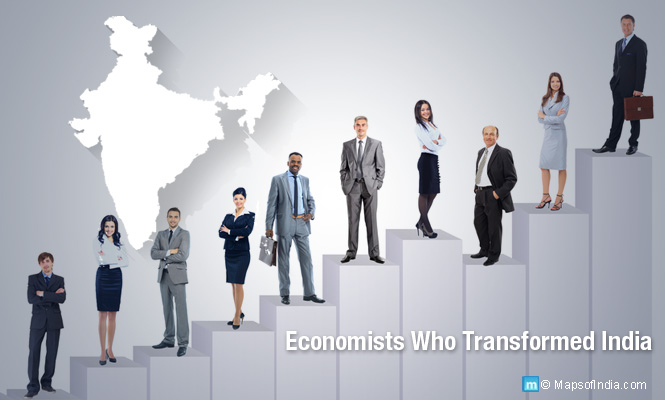Right from the times of Kautilya and perhaps from days well before him, India has given the world extremely intelligent economists and thinkers. Here are 10 of the top Indian economists of modern times.
Dr. Amartya Sen – Presidency University (Kolkata) educated Dr. Amartya Kumar Sen bagged Nobel in Economic Sciences in 1998. He was also awarded the Bharat Ratna in 1999. Some of his major studies in the world of economic philosophy include Development as Freedom and his book called Inequality Examined. Sen’s endeavours have been to understand the economic gap between the classes through a historic perspective and work towards resolving or bridging these in contemporary context. Despite having a busy academic career teaching at various universities across the globe, Sen has remained embroiled in a number of political debates and managed to remain in the news.
Dr. Manmohan Singh – Former Prime Minister Dr. Manmohan Singh is one of India’s leading economists and is known to have been the brain behind India’s socio-economic reforms and economic liberalisation. Having received his doctorate in economics from the University of Oxford, Singh served as the RBI governor and as the Chief Economic Adviser of the GoI before taking over as the Finance Minister in the P. V. Narasimha Rao government. Despite his great success as the Finance Minister and his reputation as a reform-oriented economist, Singh failed spectacularly in his role as India’s Prime Minister even as his government remained marred by various scams and highly corrupt practices.
Dr. Raghuram Rajan – Dr. Raghuram Rajan is currently India’s 23rd RBI chief and was previously the Chief Economic Adviser of the Ministry of Finance. He made a name for himself as the Chief Economist of the International Monetary Fund between 2003 and 2006. Rajan was one of the few economists in the world who predicted the global economic collapse of 2008. In India, as the RBI governor, Rajan has been credited with bringing back stability to the volatile domestic currency and in keeping credit rates well-controlled to boost economic growth.
Dr. Arvind Subramanian – Dr. Arvind Subramanian is currently working as the Chief Economic Adviser with the Indian government. An MBA from the Indian Institute of Management, Ahmedabad and a D.Phil from the University of Oxford, Subramanian also served as the GATT and the Director of Research at the International Monetary Fund. His proximity to RBI Governor Rajan and his take on Indian trade development make him one of the leading figures in the current Indian economic scenario. India Today magazine ranked him among the top 30 Masters of the Mind in India over the past three decades.
Dr. Raja Chelliah – The founder and Chairman of Madras School of Economics, Dr. Raja Jesudoss Chelliah was one of the top economists this country has produced. Armed with a master’s degree in economics from the University of Madras and a PhD from the University of Pittsburgh, Chelliah went on to become one of the top consultants in public finance anywhere in the world. Having served in an advisory capacity with the government of Papa New Guinea and a number of other countries, Chelliah became the father of the direct taxation reforms in early India. He was honoured with the Padma Vibushan in 2007 and died in 2009.
Dr. C. Rangarajan – Dr. C. Rangarajan was an illustrious Governor of the Reserve Bank of India between 1992 and 1997. Apart from this, he has served in many public services. As a Member of Parliament (Rajya Sabha), Rangarajan held office between 2008 and 2009 and was the Governor of Andhra Pradesh between 1997 and 2003. In 2002, Rangarajan was awarded Padma Vibhushan. With a futuristic view, Rangarajan did an exemplary job of heading Twelfth Finance Commission of India in 2003-2004. He is currently the Chairman of the Prime Minister’s Economic Advisory Council.
Dr. Shankar Acharya – Armed with a degree from Oxford University and a PhD from Harvard University, Dr. Shankar Acharya started working with the World Bank. Between 1993 and 2001, he served as the Chief Economic Adviser to the Government of India. In this capacity, he directed various macroeconomic reforms and fuelled industrial growth through a crucial period. Between 2001 and 2003, Acharya also served as a member of the Economic Advisory Council to the Prime Minister. He was also a member of the Twelfth Finance Commission in 2003-2004.
Dr. V. K. R. V. Rao – Dr. Vijayendra Kasturi Ranga Varadaraja Rao was one of the most eminent economists and academicians this country has produced. Having been awarded a PhD in economics from the University of Cambridge in 1937, Rao went on to popularise study of economics in India by setting up institutions such as Delhi School of Economics. Apart from his numerous roles as the Vice Chancellor of Delhi University and the Director of the Institute of Economic Growth, Rao also became the Union Minister for Education in 1971. In 1974, he was awarded Padma Vibhushan for outstanding public service. Rao oversaw the construction of many important trade routes in southern India – roadways that breathed life into India’s nascent economy.
Bimal Jalan – Apart from being the Chief Economic Adviser to the Indian government in the 80s, Dr. Bimal Jalan has also been one of the most popular RBI Governors. He served as the central bank chief between 1997 and 2003 – a period of economic turmoil for the nation. Later, he was nominated to the post of the Member of Parliament at the Upper House/Rajya Sabha. Educated at the Presidency University, Kolkata, and the University of Oxford, Jalan was responsible for the introduction of the Rs. 1,000 note in India.
Jagdish Bhagwati – Free market trade proponent, Indian-born top economist Dr. Jagdish Bhagwati is now a naturalized American, but he retains his extensive interest in the Indian economic scenario at the age of 81. Having completed his BA study both from Bombay University and Cambridge University, Bhagwati received his PhD for “Essays in International Economics” from the prestigious Massachusetts Institute of Technology in 1961. From being an economics professor at the MIT to being the external advisor to the Director General of the World Trade Organization (WTO), Bhagwati has played a number of important roles in international organisations dealing with international trade, environment, and international relations. He was awarded Padma Vibhushan in 2000.
Read Also:
Economy of India
why India is still a poor country?
Poverty and its causes in India
Unemployment on rise in India
A long way to go for India
Major issues in India




